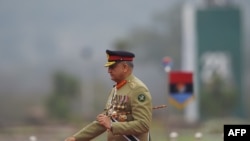Lawmakers in Pakistan’s lower house of Parliament voted Tuesday in support of extending the tenure of the country’s army chief, General Qamar Javed Bajwa, by another three years.
The government initiated the legislative action in the National Assembly and received backing from major opposition political forces who consistently have accused Bajwa of manipulating the 2018 elections to bring Prime Minister Imran Khan to power.
The bill will now go to the Senate, the upper house of Parliament, on Wednesday, where it is likely to be approved before the Pakistani president signs it into law.
The powerful military has staged several coups and ruled Pakistan for nearly half of its history. It dominates policy-making matters, particularly those related to defense and foreign affairs, say critics, even when democratically elected governments are running the country.
Several months before Bajwa was to retire at the end of his usual three-year term in November, Prime Minister Khan had approved another full term in service for the general, citing worsening military tensions with arch-rival India.
The Supreme Court, in a surprise move, however, struck down the decision just days before Bajwa was to start his new three-year term. The court identified procedural flaws in the reappointment and ordered the Khan government to refer to the Parliament to address them.
The government responded by drafting and placing the bill before the Parliament on Tuesday.
The two main opposition parties, the Pakistan Muslim League-N of former prime minister, Nawaz Sharif, and the Pakistan Peoples Party of slain ex-leader Benazir Bhutto, supported the legislation. Both the parties repeatedly have ruled the country and have a long history of confrontation with the military.
Human rights activists also accuse the Bajwa-led military of cracking down on civil liberties and muzzling the national media to discourage criticism of abuses allegedly committed by security forces during counterterrorism operations. The army vehemently rejects the charges as baseless and propaganda.
